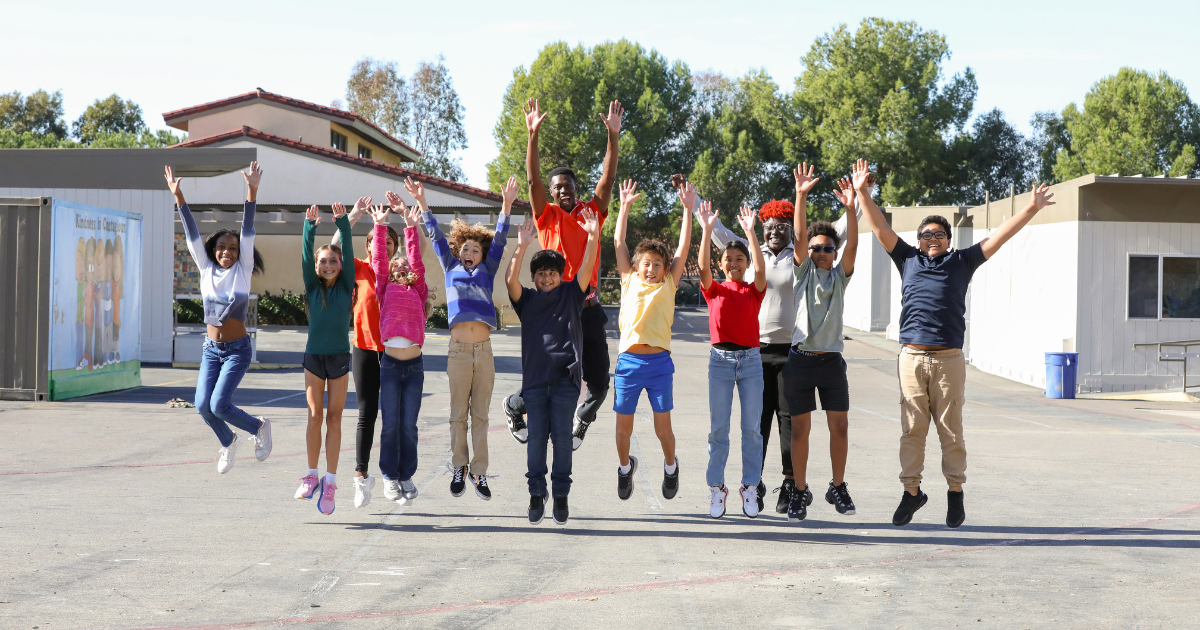
Does your school or district have a plan for expanded learning this summer? We sat down with Logan Arnold, our C&T Director of Curriculum: Academic Well-Being, to share just a few of the reasons why you should consider spending the summer with us.
Participation in summer programs has emerged as a key factor in promoting holistic development in youth. Summer programs offer a diverse range of activities, encompassing academic, physical, social, and emotional dimensions. Academic enrichment components help mitigate the notorious “summer slide,” ensuring that students maintain and even enhance their cognitive skills throughout the year (McCombs et al., 2019).
Beyond academics, summer programs promote the development of essential life skills. Engaging in various summer program activities fosters creativity, critical thinking, and problem-solving, contributing to further cognitive development (Pyne et al., 2023). The social environment of summer programs promotes positive peer interactions, teamwork, and communication skills. According to research by Buskirk-Cohen (2015), social engagement during summer programs is linked to improved social skills and emotional well-being. In essence, the holistic approach of summer programs addresses not only educational needs but also nurtures the social and emotional growth necessary for well-rounded youth development.
Summer programs have become a state and national priority, and are seen as a crucial component in the ongoing efforts to address unfinished learning, expand opportunities for students, and support their well-being. California’s Expanded Learning initiatives include support for summer programs, and the Biden-Harris Administration recently announced its “Improving Student Achievement Agenda for 2024,” in which summer programs were a point of emphasis.
Summer Program Planning Timeline
The Partnership for Children and Youth created a Summer Planning Timeline resource that spans the entire school year, and highlights concrete steps to take during each planning stage.
4 Things Districts Should Include In Their Summer Planning Process
There are a variety of factors to consider in your summer planning. For a summer program to be successful, it must meet the needs of the students, be aligned to district goals, and most importantly–it should feel like a summer program. Here are four things to include in your summer planning process:
1.) Assessing How Student Needs Have Changed
Most districts start the school year with a strategy to address areas of student need. Academic achievement, social and emotional support, attendance, student behavior and family engagement are all part of the overall strategy heading into the year. As the year progresses and summer plans start to solidify, it’s important to identify how student needs have evolved since the start of the year, and where your summer program can meet students where they are at when the school year ends.
2.) Giving Students a Voice
Identifying student needs means talking to your students, and a summer program is a great opportunity to show students they are being heard. Incorporate student feedback during your summer program planning process. Give students and their families an opportunity to provide input about what activities and experiences they are hoping to see, and then show them how that input is helping shape the summer program. Not only can this have a positive impact on participation in the summer program, but it can increase student and family engagement during the school year as well.
3.) Assessing Your Capacity to Provide Services
Once you develop a clearer picture of what you need from your summer program, you’ll need to determine if your district has the capacity to provide those services, or if you will need to partner with a program provider. There are multiple factors to consider in this assessment, including:
- Capacity to manage the program (enrollment, attendance, staff supervisions, family engagement)
- Ability to staff the program consistently (recruitment and retention)
- Training staff (initial and ongoing)
- Summer curriculum development (ensuring a variety of fun, engaging experiences that meet state requirements, district goals, and student needs)
Based on your own assessment of your district’s summer programming needs and your capacity to meet them, you may decide to work with a partner to provide some or all of the programs and services in your district.
4.) Ensuring the Summer Fun Factor
For students, the word summer often conjures visions of free time, fun with friends, and infinite possibilities. So you need to be asking yourselves: “How can we make our summer program feel like summer vacation?”
Fun needs to be present in every aspect of your program–every activity and every interaction. A summer program should not feel like a slightly modified version of the after school program, it should feel like a summer adventure that students are going on with their friends.
Having a great summer curriculum can set your program up for success, but even more important is the people who will be delivering that curriculum, and providing the day to day experience for your students. They need to bring that sense of enthusiasm and adventure every single day.
Choosing a Summer Program Partner
In searching for the right summer programming partner, you should be asking the same of them that you have asked of your own district:
- Can they meet the needs of your students?
- Do students have a voice in their program?
- Do they have the capacity to provide the services?
- Are they bringing the summer fun factor?
Every district’s needs are going to be different, and it’s important to choose a partner that fits yours. Identifying the need for a partner, conducting your search, and making a decision should ideally be completed before the end of March. The earlier you have a plan for summer, the more time you can work with that partner to ensure the summer program is aligned to the school year. This will also give your program provider ample time to recruit, hire, and train staff.
Our Full-Service Elevate Summer Program
The Elevate Summer program invites students into a safe, inclusive, and supportive environment that offers a variety of physical activity, nutrition, enrichment, academic, and social and emotional learning opportunities. Elevo coaches receive 12-hours of training on restorative practices, social and emotional supports, curriculum implementation, and classroom management. Continuous support is provided at each program from the coach’s Regional Program Manager and Training Manager on program implementation and research based, best practices on supporting youth development.
The Elevo team carefully accommodates the needs of each school district by offering half day and full day programming. Within each program, districts can select ElevoEQ or two of our many Sport options. ElevoEQ supports foundational movement and both cooperative and competitive games for students to engage in. Sport rotation options include soccer, flag football, track & field, basketball, volleyball, pickleball, and kickball.
Each week of Elevo’s summer enrichment programming focuses on a different theme, including Olympics, Space Odyssey, and Mystery Detective, to name a few. The curriculum is intentionally designed to be culturally responsive, where students are encouraged to express themselves through the arts and STEM while building connections with their peers.
Our full day programming incorporates both the arts and STEM, while building 21st Century Skills. While the first half of the day offers an arts-based enrichment component, the second half of the day incorporates hands-on, experiential STEM rotations. Additionally, programs are provided academic supports that include thematically-related read alouds with comprehension building, interactive activities.
Supplemental Support for Your Summer Program
For districts who are running their own summer programs, Elevo can also provide supplemental support to ensure those districts have everything they need to keep the fun going for students. We have been hearing concerns from some districts about summer staffing challenges, staff burnout, the need for additional enrichment activities, and more. We can help!
Elevo has grown to become one of the largest ELO-P providers in the state, and we are currently providing supplemental ELO-P support for more than 47 Districts. We have the capacity to recruit, hire, and train the staff you need. We can also bring elements of our curriculum to provide themed enrichment activities, rotational sports programs, and more.
A Summer Journey Toward a Successful School Year
A great summer program will provide fun and engaging activities, experiences, and learning opportunities for your students, while helping them build momentum for the upcoming school year. As your summer plan comes together, don’t hesitate to reach out if you are searching for a full-service partner, or for supplemental support. Elevo would love to spend our summer with you and your students!
Additional Summer Program Planning Resources
The California Department of Education has a Frequently Asked Questions (FAQ) page for summer programs.
www.cde.ca.gov/ls/ex/summerfaqs.asp
21st Century Community Learning Centers (21st CCLC) created the You for Youth (Y4Y) online community and resource hub, which includes needs assessments, goal-setting guides, observation tools, and more.
y4yarchives.org
The Partnership for Children & Youth has a Summer Resource Hub featuring videos, templates, and planning guides for school and district leaders. www.partnerforchildren.org/summerresources
The California School Boards Association (CSBA) has compiled governance and policy resources on summer learning, including webinars, guides, and more.
www.csba.org
The National Summer Learning Association has a Knowledge Center filled with resources, including research, videos, workshop opportunities, and more.
www.summerlearning.org
Resources
Buskirk-Cohen, A. A. (2015). Effectiveness of a creative arts summer camp: Benefits of a short-term, intensive program on children’s social behaviors and relationships. Journal of Creativity in Mental Health, 10(1), 34–45. https://doi.org/10.1080/15401383.2014.946637
McCombs, J. S., Augustine, C. H., Unlu, F., Ziol-Guest, K., Naftel, S., Gomez, C. J., Todd, I. (2019). Investing in successful summer programs: A review of evidence under the every student succeeds act. RAND Corporation. Retrieved from Social Science Premium Collection Retrieved from https://www.proquest.com/reports/investing-successful-summer-programs-review/docview/2267650250/se-2
Pyne, J., Messner, E., & Dee, T. S. (2023). The dynamic effects of a summer learning program on behavioral engagement in school. Education Finance and Policy, 18(1), 127–155. https://doi.org/10.1162/edfp_a_00368




